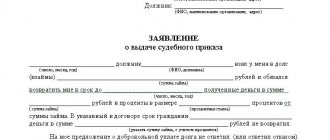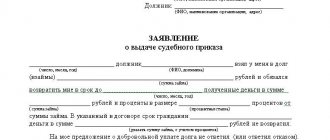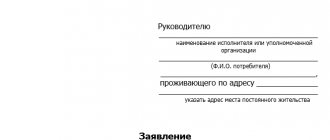What is a court order? Let's give an example of it.
A court order is a document (court order) that is issued by a judge on the basis of an application for the collection of sums of money or for the recovery of movable property from the debtor for certain requirements, if the amount of money to be collected or the value of the movable property to be claimed does not exceed 500 thousand rubles.
Important!
That is, the creditor can apply to the magistrate at the debtor’s place of residence with an application for a court order if the debt does not exceed 500 thousand rubles. A court order is at the same time an executive document and is executed in the manner established for the execution of court decisions (clause 1, part 1, article 23, art. 121, 122, clause 1, article 133 of the Code of Civil Procedure of the Russian Federation).
DEBT COLLECTION
The application for a court order must indicate:
- name of the court to which the application is filed;
- name of the claimant, his location, telephone, fax numbers, email address, bank account details;
- documents confirming the authority to sign an application for a court order;
- last name, first name and patronymic of the debtor, his place of residence or place of stay, one of his identifiers (insurance number of an individual personal account, taxpayer identification number, series and number of an identity document, series and number of a driver's license, series and number of a vehicle registration certificate funds), as well as date and place of birth, place of work (if known), telephone, fax numbers, email address (if known);
- the name of the obligatory payment to be collected, the amount of money constituting the payment, and its calculation;
- provisions of a federal law or other regulatory legal act providing for the payment of a mandatory payment;
- information about sending a request for payment on a voluntary basis;
- the size and calculation of the amount of money constituting the sanction, if it is of a property nature, and the provisions of the regulatory legal act establishing the sanction;
- other documents confirming the validity of the claimant’s claims;
- list of documents attached to the application.
How to write an application
There is no statutory template for a letter to cancel a court order.
It is drawn up in any form, but must comply with the basic requirements of procedural legislation and contain:
- data of the court, claimant, debtor;
- the essence of the dispute, the data of the act, direct expression of disagreement with the adoption of this act;
- the petition part, which indicates the request to cancel the act, is dated and signed by the applicant.
If you need to attach additional documents, you must indicate them as an attachment.
It is permissible not to name specific reasons why the debtor does not agree with the decision; what is important is the fact of filing an objection. Providing arguments and motives, especially supported by evidence (extracts from accounts, copies of receipts, etc.), is only welcome, as are references to the norms of current legislation.
In ConsultantPlus you will find samples for any occasion. Use free access to find and download what you need.
The following documents must be attached to the application for a court order:
- testifying to the sending to the debtor of copies of the application for a court order and the documents attached to it by registered mail with return receipt requested, or documents confirming the transfer to the debtor of the specified copies of the application and documents in another way that allows the court to verify that they have been received by the addressee;
- a copy of the request for payment on a voluntary basis;
- a document confirming payment of the state duty, if its payment is provided for by the legislation of the Russian Federation on taxes and fees.
DEBT COLLECTION FROM LEGAL ENTITIES
DEBT COLLECTION IN ARBITRATION COURT
When should it be submitted?
In accordance with current legislation, the application is submitted within 10 days from the date of receipt of the document from the court (Articles 128, 129 of the Code of Civil Procedure of the Russian Federation). The ten-day period is calculated not only from the date of receipt of a copy of the act on paper, but also from the day when the time for storing unreceived correspondence at the post office expired (clause 32 of the resolution of the Plenum of the Supreme Court No. 62 of December 27, 2016).
To acts of collection of obligatory payments and sanctions, for example for taxes, issued in the manner established by the Code of Administrative Proceedings of the Russian Federation, objections are filed within 20 days (Article 123.5 of the CAS RF).
Here is an example of a sample of the cancellation of a court order on taxes, which does not differ from objections within the framework of the Code of Civil Procedure of the Russian Federation.
| Justice of the Peace court district No.___ city Debtor: _____________ Claimant: _______________ Statement By court order dated ________, funds in the amount of __________ (___________) rubles were recovered from ________ (debtor) in favor of _______________. as the amount of unpaid __________ (debtor) transport tax and funds in the amount of ________ (______) rub. in the form of a penalty. _____________ (debtor) objects to the accrued and collected tax and penalties, considers the calculation made to be incorrect, since the transport tax was paid by ________ (debtor) on time. Based on the above, guided by art. 128, 129 Code of Civil Procedure of the Russian Federation, ASK: The court order dated __________ is cancelled. date Signature Application:
|
If the specified document is received in a timely manner, the validity of the adopted act is terminated, about which the magistrate issues a corresponding ruling, which is not subject to appeal. In this case, the claimant has the right to file a claim in accordance with the general procedure.
RF Armed Forces on writ proceedings
An article by the lawyer of the company KSK GROUP, Daria Akhtyrko, published in the January issue of the Russian legal newspaper “Ezh-Yurist”.
The essence of the court order
A court order is both an executive document and is executed in the manner established for the execution of court decisions, that is, it is simultaneously a judicial act and a writ of execution, and can be presented to a bank or bailiff service.
A court order, like any other institution of procedural law, has its advantages and disadvantages.
Consideration of a case in court through a claim proceeding involves the participation of all parties to the dispute and the judge’s high workload. In this regard, the undoubted advantage of the emergence of the procedure for issuing a court order is the acceleration of the consideration of cases, the simplification of complex legal proceedings, the acceleration of the procedure for the execution of a judicial act, and the unloading of courts.
The institution of judicial order is aimed at the quick and effective administration of justice with insignificant amounts of stated claims.
The negative side is that the court order is subject to cancellation if the defendant submits objections, which, in turn, leads to a doubling of the work of judges and an increase in the time for consideration of the case.
Many practicing lawyers agree that writ proceedings are a completely unworkable mechanism, since until recently the courts blocked the issuance of writs.
The clarifications of the Supreme Court of the Russian Federation once again emphasize the importance and significance of the court order in the practice of the courts, focusing on the introduction of the practice of issuing orders by arbitration courts.
In the general provisions of the Resolution of the Plenum of the Armed Forces of the Russian Federation dated December 27, 2016 No. 62 (hereinafter referred to as the Resolution), a court order is defined as a court decision (judicial act) issued on the basis of an application for the collection of sums of money and for the recovery of movable property from the debtor according to the requirements provided for in Art. 122 of the Code of Civil Procedure of the Russian Federation, and on the basis of an application for the collection of sums of money according to the requirements provided for in Art. 229.2 Arbitration Procedure Code of the Russian Federation.
Limited use
The legislation sets a limit on the amount of claims for which a court order can be issued. When filing an application for the issuance of a court order to a court of general jurisdiction, the amount of claims should not exceed 500 thousand rubles, to an arbitration court - 400 thousand rubles, with the exception of claims for the collection of mandatory payments and sanctions (claims should not exceed 100 thousand rubles .).
Despite the fact that a court order has long had the right to exist in civil proceedings, in arbitration proceedings a court order is a new institution. Writ proceedings in the arbitration process are regulated by the new Chapter 29.1 of the Arbitration Procedure Code of the Russian Federation, introduced by Federal Law No. 47-FZ of March 2, 2016.
Changes made to the Arbitration Procedure Code of the Russian Federation on June 1, 2021 changed the practice of considering claims for debt collection. Undisputed claims are subject to mandatory consideration by order. According to the reference and legal system "Consultant Plus", in the second half of 2021 alone, the Arbitration Court of Moscow issued about a thousand orders, the Arbitration Court of the Moscow Region - 255 orders, the Arbitration Court of St. Petersburg and the Leningrad Region - 448 orders.
The Resolution clarifies that if the applicant fails to comply with the order and submits an application in accordance with the general procedure, the court is obliged to return such an application.
A court order is primarily issued based on indisputable claims confirmed by the parties. The indisputability of the claims must be proven by documents, the reliability of which is beyond doubt, and also recognized by the debtor.
Deputy Chairman of the 20th AAS M. Tokareva proposed to specify the criteria for indisputability and provide examples of documents: a reconciliation act signed by the debtor, his letter of guarantee or other correspondence where he acknowledges the claims, and so on.
However, the Supreme Court did not specify this issue. The Resolution does not provide an explanation of which documents indicate the indisputability of the claims.
The resolution emphasizes that claims for compensation for losses caused by non-fulfillment (improper performance) of a contract, compensation for moral damage, termination of a contract, or invalidation of a transaction are not subject to consideration in the order of writ proceedings.
Such demands give rise to disputes between the parties, give rise to doubts in the court about the legality and correctness of the calculation of the declared amounts, and therefore are subject to consideration by the court in a general manner with a detailed study of the circumstances of the case.
Penalty
The Plenum also explains that when considering an application for issuing a court order, the court does not have the right to reduce the amount of the penalty on the basis of Art. 333 Civil Code of the Russian Federation.
It is worth noting that the impossibility of reducing the penalty does not entail the impossibility of collecting the penalty by order. This conclusion is confirmed by the Resolution of the Presidium of the Primorsky Regional Court dated November 21, 2016 No. 44G-83/2016, which summarizes: “The collector has the right, in the order of writ proceedings, to file both a demand for the recovery of interest from the debtor for the use of funds, and a demand for the recovery of overdue interest ( penalties) provided for in the contract."
Compliance with pre-trial order
The absence of a mandatory claims procedure also gives rise to a number of issues in the field of law enforcement: it contributes to abuse on the part of applicants who, at every opportunity, will go to court, bypassing the settlement of relations with the debtor on a voluntary basis, which will affect the formation of an even greater workload of the courts.
On the other hand, even if the creditor voluntarily approaches the debtor, when the debtor does not voluntarily respond to the claim, the creditor will be forced to apply for a court order.
In this case, there is a high probability of receiving objections to the order, and therefore a high probability of delaying the procedural time frame for considering the claim.
Joint and several debtors
When presenting claims against joint debtors or when presenting several claims against one debtor, a court order may be issued in cases where the total amount of the stated claims does not exceed the limits established by Art. 121 Code of Civil Procedure of the Russian Federation and Art. 229.2 Arbitration Procedure Code of the Russian Federation.
On the one hand, this provision simplifies the collection procedure for the applicant; on the other hand, if objections are provided to one of such claims, the court order is subject to cancellation in full (in relation to all joint debtors or all claims against one debtor), which creates duplication of work for the applicant .
Interim measures
The Plenum concluded that the use of interim measures during writ proceedings is not allowed.
The absence of the institution of interim measures in writ proceedings may cause claimants to file claims through litigation in order to most effectively protect their interests.
Another problem with the impossibility of applying interim measures is providing the debtor with a real opportunity to complicate or make impossible the execution of a judicial act. The difficult nature of the execution of a judicial act or the impossibility of its execution may be associated with the debtor’s lack of property or with actions taken to reduce the amount of property (Determination of the judicial panel for civil cases of the Sverdlovsk Regional Court dated 03/05/2014 in case No. 33-3731/2014).
Where and how to apply
An application for a court order is submitted to a magistrate or to an arbitration court, depending on the jurisdiction of the dispute. The rules of general territorial jurisdiction apply to the issuance of a court order.
The rules on jurisdiction at the choice of the plaintiff and contractual jurisdiction are also subject to application.
A power of attorney indicating the authority to sign a statement of claim (application) and submit it to the court can also be used as the right to file an application for the issuance of a court order.
Along with the application for the issuance of a court order, a petition may be submitted for a deferment, installment plan, a reduction in the amount of the state duty, or an exemption from its payment.
If such a request is refused, a determination is made to return the application for the issuance of a court order.
Procedure for consideration
In writ proceedings, the case is considered without calling the parties; measures aimed at considering the case on the merits are not allowed, that is, requesting additional documents, involving third parties in the case, calling witnesses, experts, specialists, translators, etc. This follows from the very essence of the requirements considered in the order of writ proceedings, which must be indisputable.
The debtor must submit objections regarding the execution of the court order to the court no later than 10 days. The beginning of the period for the debtor to submit objections is determined as the day the debtor receives a copy of the court order or as the day the period for storing judicial mail correspondence expires.
Only if the 10-day deadline is met, the court makes a decision to cancel the court order, which can be appealed by the applicant.
The deadline for filing objections is preemptive, but can be restored by the court upon presentation of evidence of valid reasons for the delay.
The court order comes into force after the expiration of the period for submitting objections regarding the execution of the court order.
If the debtor fails to submit any objections, the court order, which has entered into legal force, is certified with an official seal and sent to the claimant.
Appeal against a court order
A cassation appeal may be filed against a court order within a period not exceeding two months from the date of entry into force of the appealed court order.
A cassation appeal is filed with the arbitration court of the cassation instance through the arbitration court that issued the court order.
A cassation appeal against a court order is examined by a judge of the arbitration court of the cassation instance alone within fifteen days from the date of receipt of the cassation appeal.
Based on the results of consideration of the complaint, the cassation court has the right to leave the court order unchanged, or cancel the court order and send the case for a new trial, or cancel the court order, while indicating in the decision the right of the claimant to make a claim in the general manner.
Consequences of refusal and procedure
The court must refuse to accept an application for issuing a court order on the basis of Part 3 of Art. 125 Code of Civil Procedure of the Russian Federation, Part 3, Art. 229.4 of the Arbitration Procedure Code of the Russian Federation, including in the following cases:
- if the amount of the stated claim or the total amount of several claims specified in one application exceeds the established limits;
- if, along with the requirements provided for in Art. 122 Code of Civil Procedure of the Russian Federation, Art. 229.2 of the Arbitration Procedure Code of the Russian Federation (for example, about debt collection), other requirements are stated that are not provided for by these articles (for example, about termination of a contract, recovery of moral damages);
- if the application for the issuance of a court order and the documents attached to it affect the rights and legitimate interests of persons other than the claimant and the debtor (the presence of joint and several debtors or other persons who provided security, the requirements for which are not presented in the application for the issuance of a court order, is not a basis to refuse to accept such an application);
- if circumstances are identified that are grounds for terminating the proceedings (Article 220, Part 4, Article 1 of the Code of Civil Procedure of the Russian Federation, Article 150, Part 5 of Article 3 of the Code of Arbitration Procedure of the Russian Federation).
Refusal to accept an application for a court order prevents repeated filing of the same application. In this case, the applicant may submit claims in the manner of claim proceedings or proceedings in cases arising from administrative and other public legal relations, indicating the refusal to accept the application for the issuance of a court order.
In this case, the state fee paid by the applicant on the application for the issuance of a court order can be offset against the state fee payable for filing a statement of claim.
If the applicant does not agree with the court's decision to return or refuse to accept the application for a court order, he can appeal it in accordance with Art. 331 Civil Procedure Code of the Russian Federation and 188 Arbitration Procedure Code of the Russian Federation. The period for filing such a complaint is 15 days from the date of the ruling. Consideration of the applicant's complaint by the appellate authority should not exceed 15 days from the date of receipt of such a complaint.
Appeals against court rulings on the return of an application for issuing a court order have already been reflected in the practice of arbitration courts: decisions of the Arbitration Court of the Eastern Military District dated 09.12.2016 No. F01-5134/2016 in case No. A82-10332/2016, the Ninth Arbitration Court of Appeal dated 05.12.2016 No. 09AP-56024/2016 in case No. A40-184179/2016, Thirteenth Arbitration Court of Appeal dated 01.09.2016 No. 13AP-21951/2016 in case No. A56-42795/2016.
To return an application for a court order, the judge must establish the existence of grounds within three days from the date of receipt of such an application. However, missing a deadline does not deprive the judge of the right to issue a ruling on the return of the application for the issuance of a court order.
Such a clause allows judges to delay the deadline for issuing rulings on return, since it does not entail any negative consequences for the court, and for the applicant it will affect the delay in resolving the fate of the debt collection case.
Finally
The adoption of the Resolution was due to the need to unify the rules of civil and arbitration proceedings, fill gaps in the law, and clarify and clarify the adopted rules.
Despite the clear algorithm for writ proceedings given to the courts, the Resolution largely cites procedural norms without providing explanations on truly significant controversial issues.
The Plenum does not specify or provide answers to what documents indicate the indisputability of the claims, or how to prove the absence of claims on the part of the defendant.
In addition, the Supreme Court of the Russian Federation gives a negative answer to the question about the possibility of taking interim measures in writ proceedings. This can contribute to abuse on the part of debtors, as well as difficulties in collecting, and sometimes the impossibility of collecting, the requirements of the court order, which, in turn, will lead to failure to achieve the goals of the writ proceedings.
In our opinion, the trend towards an increase in the number of court orders issued will continue. The institution of writ proceedings will be used as an effective tool for debt collection for small amounts of claims.
Why file an objection to cancel a court order?
- No debt.
The person to whom the court order was sent does not have a debt, and an error has occurred. In practice, MFOs often confuse relatives and even namesakes, and as a result, bailiffs collect someone else’s loan.Remember - the bailiff must execute the judicial act; he does not have the right to assess the correctness of the decision. Therefore, urgently write objections to the court order to the court, and ask the bailiff to suspend the collection until the objections are considered.
- Wrong amount of debt.
For example, if the debtor believes that he owes 35,000 rubles, but the order states 58,000 rubles. - Time stretching.
If the return of the court decision cannot be avoided, you can gain several months by canceling the court order, so that during this time you can figure out where to get the money. In addition, upon consideration of the claim, it will be possible to reduce interest and penalties or negotiate with the bank on installment plans.
Our practice and experience allow us to quickly solve such problems. If you need help canceling a court order, consult with our lawyer for free by calling us or writing online.
Court order
Author of the article Konstantin Milantiev
Publications 222
More information →
about the author
Expert in the field of bankruptcy of individuals. He has been an active arbitration manager since 2015. Konstantin’s publications are published in various expert publications and media. Active participant in conferences, seminars and discussions on amendments to the current legislation of the Russian Federation on bankruptcy.
Rate this article
130 likes
Share with friends:
Pros and cons of writ proceedings
The advantage of writ proceedings is the shortened period for consideration of the claimant’s application (Article 126 of the Code of Civil Procedure of the Russian Federation). In addition, the application is considered without summoning the parties, and the state fee for consideration of the application is paid in a smaller amount than when filing a claim in court.
The disadvantage of writ proceedings is the cancellation of the court order by the magistrate who issued it in the event of the receipt of unmotivated objections from the debtor regarding the execution of this court order within ten days from the moment it was received by the debtor (the debtor is not required to justify his objections) (Article 129 of the Code of Civil Procedure of the Russian Federation). In addition, the possibility of appealing court orders of the Code of Civil Procedure of the Russian Federation is not provided for (for more details, see below).
The problem is that if for some reason the debtor has not received a copy of the court order, the ten-day period for filing objections to it does not even begin to run and, subsequently, having received a copy of the court order, the debtor will be able to file his objections regarding its execution.
So, for example, the Constitutional Court of the Russian Federation indicated: “...by virtue of Articles 127, 128 of the Code of Civil Procedure of the Russian Federation, a court order is sent once and to the address indicated by the claimant. However, due to the fact that the period during which the debtor has the right to file objections to the court order begins to run from the moment the debtor receives the court order (Article 128 of the Code of Civil Procedure of the Russian Federation), and the debtor can change his location, the contested norms do not exclude the possibility of re-submitting the court order to the debtor at his new location in order to prevent the writ proceedings from being delayed indefinitely” (decision of the Constitutional Court of the Russian Federation of November 20, 2008 N 1035-О-О)
Possibility of appealing a court order
A court order cannot be appealed
The possibility of appealing court orders is not provided for by the Civil Procedure Code of the Russian Federation. A court order can be appealed to a cassation court in the manner, within the time limit and on the grounds provided for in Chapter 41 of the Code of Civil Procedure of the Russian Federation (clause 1 of the Resolution of the Plenum of the Supreme Court of the Russian Federation of June 22, 2021 N 16 “On the application by courts of the norms of civil procedural legislation regulating proceedings in court of appeal").







